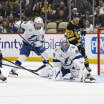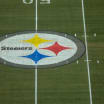Brassard vows to come back better than ever

Brassard, who has yet to win a Stanley Cup, had faced the Penguins each of the last four postseasons, with his clubs winning the first two meetings and getting eliminated in the last two. The 30-year-old center had earned both a reputation for being a solid two-way player along with the nickname "Big Game Brass" for his playoff pedigree.
While the adjustment process didn't go as well as both sides hoped for a number of reasons, both Brassard and the Penguins are excited to see what will happen next season.
"For me personally, it's just to come back next year and go through a full training camp with this group, find some chemistry and try to be a big part of this team," Brassard said. "I know we can have another big run. We have the same team, the same core. I believe in this team. I think we have a good group."
Looking back on it, Brassard admitted the initial transition proved harder than he expected. Adapting to a completely different role was the biggest reason for that.
During his time with the Ottawa Senators and New York Rangers, Brassard always centered one of their top-two lines. He knew that wasn't going to happen in Pittsburgh, with Sidney Crosby and Evgeni Malkin ahead of him on the depth chart.
"I was used to playing in the two spot in Ottawa and New York, but I knew coming in here I was not going to be in the two spot or the one spot, obviously," Brassard said with a laugh.
"He's playing behind two generational talents and so because of that, he played a very different role than he's accustomed to play," Penguins head coach Mike Sullivan added.
Brassard averaged 18:21 minutes in 58 games with Ottawa during the regular season, which dropped to 15:12 minutes in 14 games with Pittsburgh. During the postseason, Brassard averaged 13:29 minutes with Pittsburgh after averaging 18:11 minutes in 2017 with Ottawa.
Sullivan had considered moving Brassard to the wing at times to get him more minutes, but ultimately decided that he was best utilized at center since depth at that position was more important.
As Sullivan told Brassard, he felt that nobody in the league was stronger at that position than the Penguins. And Brassard was more than willing to do whatever the coaching staff asked of him, saying he would have played five minutes if he had to.
"I was ready to do anything to help the team try and win some games," he said. "At this time of the year it's not about you, it's about the team. That's the first thing that I noticed here, was just those guys are tight and it's a good team, it's a good group of guys."
While the coaching staff appreciated his attitude, they also understood the challenges Brassard faced. Sullivan did what he could to find him more ice time, but it wasn't always possible with how the Penguins are structured.
"For example, he's not on our first power play," Sullivan said. "On most teams that he's played on, he's been on their first power play or got significant time on a second power play. The way this team operates, our first power play gets the predominant time on every power-play situation. That's unique to this team.
"So as much as we can say that we'd like him to play the same role as he did on every other team, by nature of how this team is built, it's different. And because of that, I think there was an adjustment process and we didn't get to the point where we were hoping we were going to get. But I do think that there's a real great opportunity for us to get there."
And when they were able to find him the minutes, especially when Malkin missed three playoff games with a lower-body injury, Brassard struggled to adjust to Pittsburgh's style after coming from a team with a completely different structure.
"Even in the playoffs sometimes I was making not mistakes, but I wasn't in the right position or I was thinking a lot out there," he said.
It helps that Brassard will be healthy. Right as he was starting to get more comfortable with his new team - which showed with a six-game point streak where he collected two goals and six points - he suffered a lower-body injury that forced him to miss the last five games of the regular season.
Though Brassard was able to return for Game 1 of the First Round against Philadelphia, he was still dealing with the injury, one that Penguins general manager Jim Rutherford said was "very difficult" to play through.
"He was just getting to the point where he was starting to come, he was putting up points and then he got an injury that he couldn't overcome," Rutherford said.
Brassard's teams have made the playoffs each of the last five seasons. He's skated in 90 postseason games since 2012-13, which is tied with Malkin for the third-most in the league over that span and trails only Carl Hagelin (104) and Crosby (92).
He's looking forward to not only recovering from his injury, but getting lots of rest and coming back rejuvenated in the fall.
"It's going to be good to kind of relax a little bit," Brassard said. "Get your mind and your body off the game a little bit and take a couple weeks off before going back at it. Get re-energized and have a good summer of training."


















































